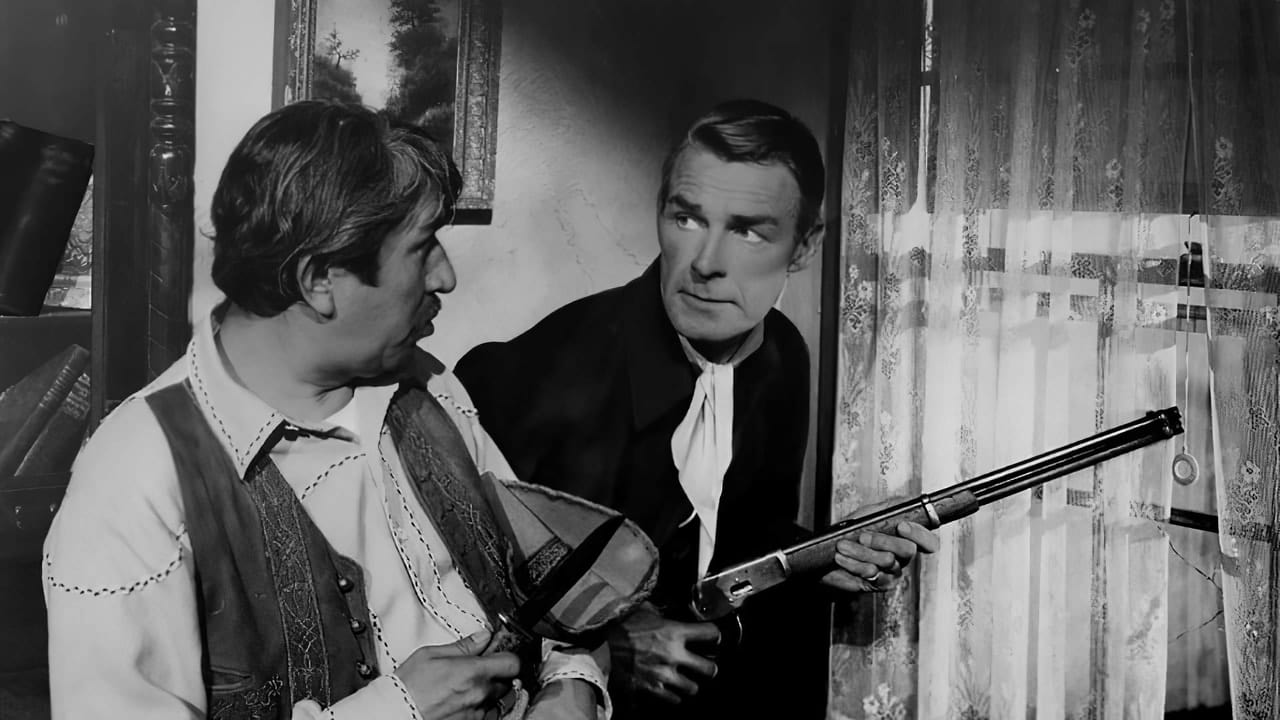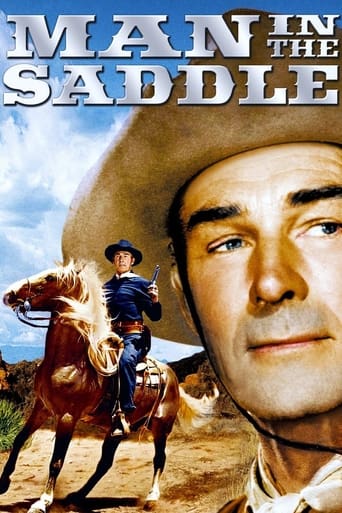Boobirt
Stylish but barely mediocre overall
Thehibikiew
Not even bad in a good way
Lumsdal
Good , But It Is Overrated By Some
Supelice
Dreadfully Boring
Marlburian
Some of the reviews here nearly dissuaded me from watching this film, which doesn't seem to have been screened much on British TV (certainly I was unaware of it), whereas the Boetticcher and other later Scott Westerns are shown regularly."MITS" compared very well indeed with these, and the plot was different to those of "stranger riding into town and trouble"). It's been remarked that Scott was a bit old for the two female leads, but that was the case in many of his later Westerns (and Gary Cooper's too). The colour photography also added to my enjoyment of the film. It was good to see Guinn Williams in a role that wasn't his "comic sidekick" one, and also John Russell as a jealous admirer. Joan Leslie's romantic vacillations were a bit unconvincing, as were the final scenes.Unlike at least one previous reviewer, I didn't notice the differing appearances of Scott and his fight stand-in, and I doubt that cinema viewers in the early 1950s did either.(I've just checked the date of release, and was a little surprised, as the film had the "look" of one made late in the decade or even the early 1960s.)I'm glad that I watched it.
398
I saw Man In the Saddle decades ago and rewatched it recently. It is at once memorable and yet well below average. Memorable because instead of the usual revenge plot or greed-driven villainy, the two main villains are men obsessed with women who are indifferent to them and who finally explode into shocking violence which lingers after everything else about the film is forgotten. Well below average because of an underdeveloped script, flaccid direction, miscasting, and indifferent performances.The miscasting begins with the star. Randolph Scott was 53 when this movie was made and while the leathery old dog might still be able to turn a few bonnets, he does seem a bit long in the tooth to find himself being chased by two women young enough to be his daughters. The implications of the plot may have bothered Scott. I saw Man In the Saddle back to back with Riding Shotgun and his torpid performance here is a night and day contrast with his forceful effort in the more traditional Shotgun. The two leading ladies, Ellen Drew and Joan Leslie, were third-stringers from the forties whose careers faded with their youth. Drew gets by in an undemanding part which requires little more than looking longingly in the direction of Scott now and then, but Leslie is woefully out of her depth. Laurie Bidwell Isham is an icy, calculating woman who shucks Scott, the love of her life, to enter into a business marriage with the wealthy Will Isham, well played by Alexander Knox. She coldly rebuffs the repressed Isham's fumbling intimations of affection, leaving no doubt that one clause in their marriage contract was separate bedrooms. She also tosses her father out of her wedding reception and her life as he reminds her all too forcefully that she came from the wrong side of the pasture. The echoes of the wedding bells have barely faded before she is secretly riding under the stars back to Scott. This role required an actress of the depth of a Patricia Neal. It got Leslie rehashing her chirpy ingenue performances of the war years.Alexander Knox as Will Isham and John Russell as Hugh Clagg, the two spurned lovers, are the movie's only real assets. Isham goes sour, but he has a better side and one gets the impression an affectionate Laurie might have brought it out. When Laurie offers to go away with him at the climax, he abandons all plans for revenge or power and briskly agrees, only to be almost immediately shot down by his own hired gun. Russell is intense in the redundant role of a man hopelessly obsessed with Drew. I think he is miscast. He is twenty years younger than Scott, is strikingly handsome, and has an engaging smile. He should have switched roles with Richard Rober, pallid as a foppish gunslinger. Russell would have made a much more menacing killer. Rober's ordinary looks and bland personality might have convinced as the rejected suitor. The movie only really comes alive when Isham or Clagg boil over into outbursts of violence. The rest is slow soap-opera complications and heavy-handed comedy relief, punctuated by a few ordinary action scenes. The final shootout between Scott and Rober is forgettable. Andre De Toth proves himself a limited director. The script meanders along various tangents, but leaves the pivotal character of Isham somewhat underdeveloped and the perhaps even more pivotal character of Laurie totally undeveloped. She marries a man she doesn't love for his money and when he is killed at least partially because of her behavior, she ends up with the money. Is that all? A better script would have fleshed out this role and possibly fished for some irony in the ending.All in all, there might have been a good movie underneath all the dross struggling to get out, but it never made it. As is, seeing and hearing a young Ernie Ford sing is a nostalgic treat. Otherwise, at best a time filler for a rainy day.
bkoganbing
Big rancher Alexander Knox has married Joan Leslie former girlfriend of smaller rancher Randolph Scott. Knox is a brooding jealous sort of man and wants Scott out the territory. He hires some gunslingers headed by Richard Rober to do the job.Scott's a 'peaceable man' in the tradition of Wild Bill Elliott, but don't provoke him too much. But Knox is determined to start a range war out of jealousy.It becomes an open war after Rober kills brothers Cameron Mitchell and Richard Crane who work for Scott. And the wild part is that Scott's now taken a fancy to Ellen Drew. A previous reviewer said that Alexander Knox was miscast in a western. True he isn't a typical western actor, but a whole lot of people went west to make names for themselves of all kinds. Knox does a good job of the brooding and jealous rancher with a deep seated inferiority complex.Now it's also true that Richard Rober is a little too nattily dressed for a villain, but that sure is a western stereotype. I think he made a very good villain in this western. Rober was tragically killed in an automobile accident soon after this picture was finished. A good career in villainy was cut short.A lot of plot similarities to this and The Violent Men also done by Columbia Pictures a few years later. It's a good entry from the Randolph Scott western collection.
John W Chance
This formulaic film (hero's girlfriend marries the villain) just didn't move along fast enough given some of the circumstances of the story. Scott seems too old in this one, and too many times his character turns away from decisive action, deflating the scenes. He responds to the deaths of some of his hands weakly; he escapes from Knox's gang by hiding in a full rain barrel; his escape to the high country and pursuit by John Russell seem superfluous, as does much of the film. The plot could have been tightened. High points of the film: seeing "Tennessee" Ernie Ford without a mustache singing "Man in the Saddle"; Alfonso Bedoya's too brief scenes as a cook; the color photography of the high country, and the fight scene there with John Russell.

